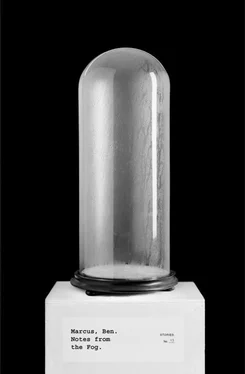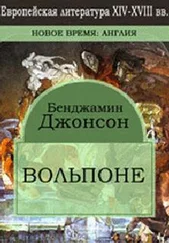In his little group, the men were talking about hunting, even though only one of them seemed to do it. The others got by on saying how much they would like to do it, or intended to try it, once certain conditions were met. A season was beginning, the hunter was saying, or a season was ending, and then something else about traps. Where you put them, when you checked them, and how you baited them.
“Really, now,” the hunter said, “I just load the fuckers up with candy.”
The men all chuckled.
Fowler looked at them, one by one, and very nearly saw through their faces into something more. Punishing insights. Understandings. But it clouded over. He lived in an unpromising time; that was just a fact. A time of terrible ignorance. Too little information about what mattered the most. There wasn’t, as yet, a good tool to get a clear picture of exactly what others were thinking. This ability was probably on its way for people, a hundred years out, maybe. One hundred and fifty. Things would open up, in all sorts of ways. A method of getting in there and really knowing something. But Fowler would be dead before such technology came along.
He wondered if, on his deathbed, he’d want to be told what was really in store. Deathbed. That was a joke. There’d be no bed. Fowler could picture himself, all too convincingly, running through trees, scrambling up a hillside, taking bullets to the torso. They’d itch going in, he figured. Itch and burn. He hadn’t been shot before, but it didn’t tax the imagination to picture it. It came to him sometimes almost like a memory.
The hunter went on about traps. You had to clean them after each use, and the process sometimes needed a hose, or even this thing, and he tried to make a drawing of it with his hands. He said one thing he saw in a trap was something he’d not forget. An animal eating candy with a jaw-clamp of knives sunk into its haunch. Almost happy. Going through the candy pretty slowly, sort of relaxed.
You heard a version of this story as a kid. Animals caught in traps chewed off a leg to escape. Fowler had to wonder. Obviously it hurt a little bit. That wasn’t something anybody would really want. But if you did have to do it, and you found yourself, as an animal, chewing into your own flesh, tearing it away, trying to gnaw through the bone, which was when the project got serious, was there ever a moment, even just for a second, when you felt like you’d been born to the job? A kind of pure calling? The slow destruction of oneself with one’s mouth? You’d be smart leaving room around categories like that, he thought. Not to believe that you know what there is to be known. You don’t.
They were standing in a circle, eating. Some of the men held little glass jars of beer. Fowler kept away from that. He took in all the liquid he needed at night.
The kids were out today, because everybody said that the block party was really for them. You did this kind of thing for the kids. And then you also took part in it for the kids. You went to work for the kids. You cooked dinner for the kids. You cleaned up for the kids. When you had kids, according to the people who blasted Fowler with their views, what you did you did for them. Even when you had more kids, you did it for the kids you already had, and when you struck one of them in the face, everyone should know whose good it was for. Whereas if you didn’t have kids, like Fowler and his wife—despite a verbal project that circled the possibility, but had long since faltered—what you did you apparently did for yourself. Or maybe for no one. To hear the parents talk, without kids you were nothing, a quarter person, a kind of costume that could be hung on a hook. You powered down in the evening and your body deflated in the corner. Someone could kick you down the street like a trash bag.
Some young people at the block party were making a disturbance. Fowler caught sight of the girl pretty quickly. The girl—this wasn’t really how he would come to think of her. It was just that the usual words were not ideal. They didn’t fully seem to function. There was too much slippage, like an electric short that kept them from sticking. He would learn her name, and wish he hadn’t. In Fowler’s view the name didn’t suit her. It was like a small lie that needed to be owned up to. He would come to an arrangement with himself not to use it. He would go to her house, watch her sleep, but this first time, out in the wild, was different, and he’d never see her that way again.
The girl had on what looked like men’s pants and a sort of circus sweater. The pants were high-waters and the sweater, too, but on her arms, like maybe she’d gone swimming and her clothes seized up, tried to vanish off her body. A creature who fell asleep for a very long time and woke up too large for her clothing. Her hair was piled in some kind of bundle as if her crafter had dropped it on her head from the sky. Because she was not ordinary. She had not been made in the normal way.
She was singing or she was shouting, and maybe what was making all of her friends laugh is that they weren’t sure which one. In a group of creatures, regardless of the species, there is sometimes one who seems to control the blood of the others.
Fowler tucked deeper into his sausage roll and saw all the men looking at her, not hiding it, their faces made of rubber and their eyes scratched from their heads, like in a picture.
As the girls walked by, the men turned small and strange. No one breathed. They just waited for the girls to get clear and then you could feel them catching up on their breath.
They again gave each other glances. Just a significant exchange of silence, trying not to break into pieces.
“Well, thank god I don’t shit in my own backyard,” one of them finally said, shaking his head.
“Hell, I don’t shit in my own toilet,” someone replied, and they all laughed.
Fowler would see her asleep in a month. You didn’t keep records for things like that, because of course. He would stop in, take a look, gather some items, and truck them up to the hut, where a certain kind of situation was taking shape. A residence, a place, a grave. Today her face seemed filled with air. He squinted so she could be blurry.
A bit more chatter, everybody silently agreeing that they wanted to destroy what they’d seen, that they could remove the small parts of their bodies and make a pile there in the street. For someone to find later. Someone smart, a sort of scientist, who could look at it, throw his hand into it, and have a close enough idea of just what had happened in this place.
Then the men tensed up. “Shut up, shut up,” someone said, “here they all come.”
It was the wives, bombing at them from the other side of the street. They closed in pretty fast and acted like they’d missed all the fun.
“What are you all laughing about?” One of the wives turned to Fowler.
The Shebster wife, the Coramper one. He didn’t remember. Those sounded like fake names to him, like they had all lied about who they really were. He wanted to keep eating. A tough bit of cartilage was lodged in his mouth. He was almost done chewing. He’d do anything not to look at the girl. You had to follow a ration.
This wife was really on him.
“Tell us what these guys said or we will torture you,” she shrieked.
Fowler saw where this woman would be buried and he saw the weather for it, her children crying at her grave. If he really strained he could see the children themselves get old and bloat with fluid until they burst.
She touched him and he stopped eating. “Are you ticklish?” The men all watched.
Fowler was occupied with the larger question of how many ways the girl could look, doing different things, even long after she’d died. As bones, as powder, at night, having all of the different feelings, and if any of those ways would change what he felt should happen—that she and Fowler should combine themselves in a remote location. Even the girl’s father, whom Fowler had seen, and once spoken to, had, buried in his face, something that drew Fowler in.
Читать дальше











